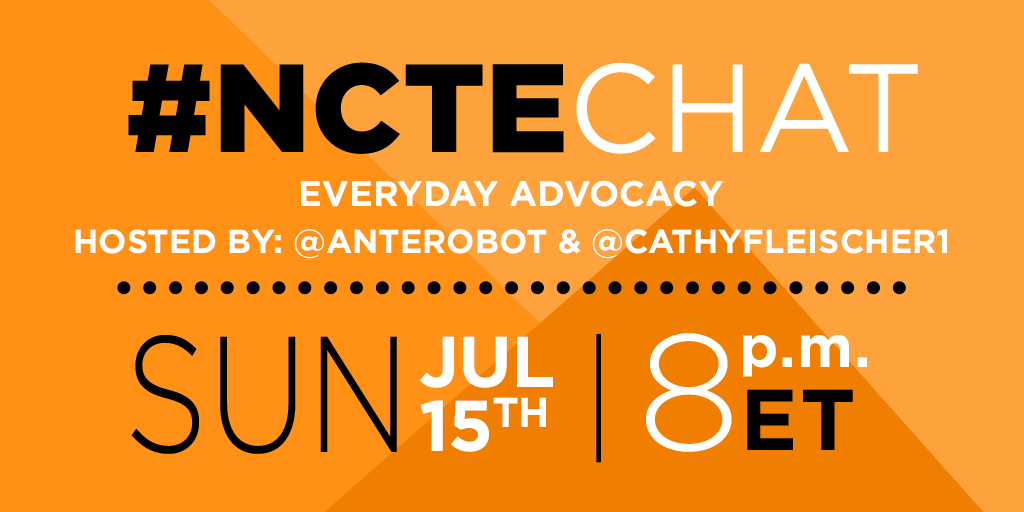Cathy Fleischer (@CathyFleischer1), Eastern Michigan University
Antero Garcia (@anterobot), Stanford University, CA
July 15, 2018 – 8 p.m. EST
This month’s #NCTEchat is a call to action.
By the end of our chat we are hoping that you (yes, you!) will become an advocate for an issue that’s important to you in literacy education. As a means of staying vigilant and proactive over this summer, we are going to discuss topics in literacy education that are keeping you up at night, identify ways to address these issues, and work together to ensure that English educators are at the helm of positive, transformative change.
We get it: that sounds like a lot. (It’s the summer after all!)
However, we believe that advocacy doesn’t have to start big and it doesn’t have to be done alone. Describing what it means to be an everyday advocate on this powerful resource, Cathy Fleischer writes:
Everyday advocates are teachers who are committed to changing the public narrative surrounding education–beginning in our local contexts. We are teachers who believe that by working together we can and will make a difference in how literacy is taught. And we work to make this a part of our everyday teaching lives.
More than ever, the narrative about teachers, schools, and public education is being contested in the media, online, and within local and national policies. Recognizing this, we are going into this month’s #NCTEchat with one idea at the center of our questions: Every teacher has the capacity to be a powerful advocate in local and national efforts that are personally meaningful. No matter whether you’ve felt like an advocate before, we hope this dialogue is one that leads toward collaborative growth for all of us. We’re going to work together. At least for this one Sunday in July, we are building capacity.
Just before summer began, Cathy Fleischer and I recorded a five-part video series describing the key principles of what it means to be an everyday advocate. Don’t worry, you don’t need to watch these before this month’s chat. However, they’re embedded here to save you a few clicks. We encourage you to take a look at the first, short introduction to Everyday Advocacy if you have time:
Interested in seeing more? We’ve embedded the other videos at the end of this post.
We look forward to talking with, learning from, and advocating with all of you this Sunday!
The following questions will be shared during our Twitter chat, after introductions:
Q1: Everyday advocacy begins with focusing on an issue surrounding literacy education that you wish others understood better. What’s that issue for you? #NCTEchat
Q2: Everyday advocates work in ways that are smart, learning as much as possible about their issue. What steps could you take to learn more about your issue? #NCTEchat
Q3: Everyday advocates also work in ways that are safe, developing allies among colleagues and the community. Who might be allies surrounding your issue? #NCTEchat
Q4: Everyday advocate also work in ways that are savvy, developing strategies and tactics to reach others. What kinds of tactics might work for your issue? #NCTEchat
Q5: In order to make change, everyday advocates find ways to make this work sustainable, fitting it into their day-to-day lives. How might you do that? #NCTEchat
Q6: What’s your next step toward becoming an everyday advocate? #NCTEchat
Part 2: Smart Advocacy with Kris Gedeon
Part 3: Safe Advocacy with Sarah Andrew-Vaughn
Part 4: Savvy Advocacy with Alaina Felix
Part 5: Sustainable Advocacy with Beth Shaum

